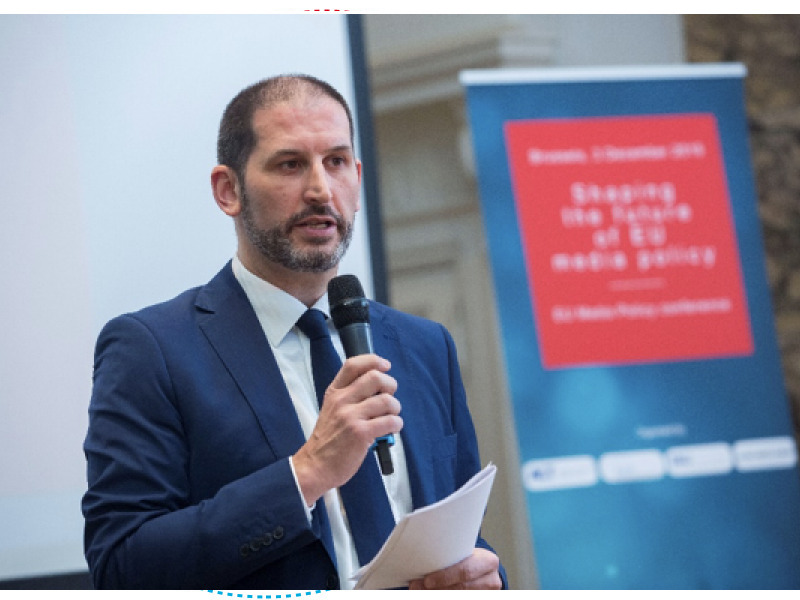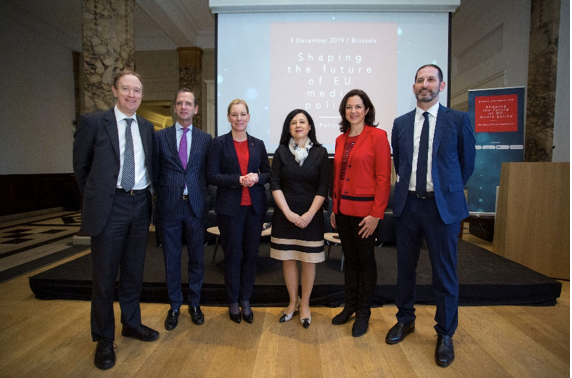When you look around you it is obvious that the changing media landscape is bringing with it huge challenges and the possibility of even bigger upheavals to come. Within this context, on December 3, 2019, Professor Mark Cole, from the University of Luxembourg, faculty of Law, Economics and Finance, help to moderate a high-level conference in Brussels, “Shaping the future of EU media policy”.

The conference, “Shaping the future of EU media policy” focused on that fact that the world is at a turning point in the history of the media sector, in Europe and elsewhere. The new mandates of the European Parliament and European Commission provide the perfect opportunity to assess the situation and see how to foster the best possible policies for Europe’s media sector to thrive in the coming years. The event was organised in Brussels by News Media Europe, the Association of European Radios, the Association of Commercial Television in Europe and the European Broadcasting Union.
The conference, opened by Vera Jourová, Vice President of the European Commission for Values and Transparency, dove deep into three essential aspects:
- How citizens can enjoy trustworthy and independent journalism
- How the media sector can thrive in the mid to long-term perspective
- How competition policy needs to be fit for the globalised digital environment
Professor Mark Cole, of the University of Luxembourg, Faculty of Law Economics and Finance, contributed greatly to the success of the day, acting as “Day Moderator”. He was a perfect fit as he is Professor for Media and Telecommunication Law at the University of Luxembourg
since 2007 and Director for Academic Affairs at the Institute of European Media Law (EMR) in Saarbrücken since 2014.

Professor Cole said of the day, “It was a remarkable event in that for the first time across different interests, the major EU-related media associations gathered for the organisation of a conference: radio, commercial and public service television, news media including publishers. The conference came at a very timely moment, on the second working day of the new Commission. Vice-President Jourova gave an inspiring outlook for the activities of the new college, which will shape the future EU media law and policy. It was a privilege to moderate such a high-level event with an inspiring keynote by Commissioner Jourová and the conference themes covering the focus areas of our Master programme in Space, Communication and Media law as well as my research activities, giving me insights and ideas for future directions”.
Following the keynote speech by Commissioner Jourová, vision statements were by given by Victoria Svanberg, NME Vice-President (Board Member of NWT Group), Guillaume de Posch, ACT President (Board Member of RTL Group), Corinna Drumm, AER Vice-President (Managing Director of the Association of Commercial Broadcasters in Austria) and Richard Burnley, EBU Legal & Policy Director (European Broadcasting Union). Three panel discussions filled the agenda for the rest of the day on the topics of, “Fostering and preserving quality journalism”, ”Conditions for a thriving media sector” and, “Fair competition in digital markets”.
Closing remarks were made by Anna Herold, European Commission, Head of Unit for Media Services Policy.
Professor Mark David Cole is a Full Professor at the University of Luxembourg, Faculty of Law, Economics and Finance. Mark Cole is Professor for Media and Telecommunication Law at the University of Luxembourg since 2007 and Director for Academic Affairs at the Institute of European Media Law (EMR) in Saarbrücken since 2014. He is member of the Advisory Committee of the Luxembourg Independent Media Authority (Autorité luxembourgeoise indépendante de l’audiovisuel, ALIA) and takes a seat in the Advisory Council of the European Audiovisual Observatory of the Council of Europe. He specialises in European and Comparative Media Law, covering the whole range of the regulatory framework for both traditional mass media as well as the law of the new information technologies which includes data protection and intellectual property law.
